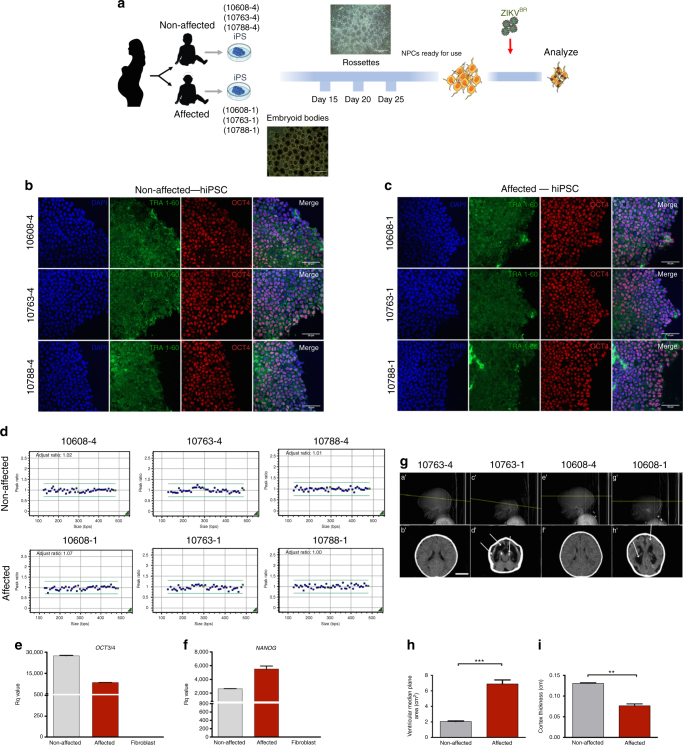Discordant congenital Zika syndrome twins show differential in vitro viral susceptibility of neural progenitor cells.
Congenital Zika syndrome (CZS) causes early brain development impairment by affecting neural progenitor cells (NPCs). Here, we analyze NPCs from three pairs of dizygotic twins discordant for CZS. We compare by RNA-Seq the NPCs derived from CZS-affected and CZS-unaffected twins. Prior to Zika virus (ZIKV) infection the NPCs from CZS babies show a significantly different gene expression signature of mTOR and Wnt pathway regulators, key to a neurodevelopmental program. Following ZIKV in vitro infection, cells from affected individuals have significantly higher ZIKV replication and reduced cell growth. Whole-exome analysis in 18 affected CZS babies as compared to 5 unaffected twins and 609 controls excludes a monogenic model to explain resistance or increased susceptibility to CZS development. Overall, our results indicate that CZS is not a stochastic event and depends on NPC intrinsic susceptibility, possibly related to oligogenic and/or epigenetic mechanisms.
Authors
Luiz Carlos Caires-Júnior; Ernesto Goulart; Uirá Souto Melo; Bruno Henrique Silva Araujo; Lucas Alvizi; Alessandra Soares-Schanoski; Danyllo Felipe de Oliveira; Gerson Shigeru Kobayashi; Karina Griesi-Oliveira; Camila Manso Musso; Murilo Sena Amaral; Lucas Ferreira daSilva; Renato Mancini Astray; Sandra Fernanda Suárez-Patiño; Daniella Cristina Ventini; Sérgio Gomes da Silva; Guilherme Lopes Yamamoto; Suzana Ezquina; Michel Satya Naslavsky; Kayque Alves Telles-Silva; Karina Weinmann; Vanessa van der Linden; Helio van der Linden; João Ricardo Mendes de Oliveira; Nivia Maria Rodrigues Arrais; Adriana Melo; Thalita Figueiredo; Silvana Santos; Joanna Goes Castro Meira; Saulo Duarte Passos; Roque Pacheco de Almeida; Ana Jovina Barreto Bispo; Esper Abrão Cavalheiro; Jorge Kalil; Edécio Cunha-Neto; Helder Nakaya; Robert Andreata-Santos; Luis Carlos de Souza Ferreira; Sergio Verjovski-Almeida; Paulo Lee Ho; Maria Rita Passos-Bueno; Mayana Zatz
External link
Publication Year
Publication Journal
Associeted Project
Systems Immunology of Human Diseases
Lista de serviços
-
As antisense RNA gets intronic.As antisense RNA gets intronic.
-
Androgen responsive intronic non-coding RNAs.Androgen responsive intronic non-coding RNAs.
-
Conserved tissue expression signatures of intronic noncoding RNAs transcribed from human and mouse loci.Conserved tissue expression signatures of intronic noncoding RNAs transcribed from human and mouse loci.
-
The intronic long noncoding RNA ANRASSF1 recruits PRC2 to the RASSF1A promoter, reducing the expression of RASSF1A and increasing cell proliferation.The intronic long noncoding RNA ANRASSF1 recruits PRC2 to the RASSF1A promoter, reducing the expression of RASSF1A and increasing cell proliferation.
-
Antisense intronic non-coding RNA levels correlate to the degree of tumor differentiation in prostate cancer.Antisense intronic non-coding RNA levels correlate to the degree of tumor differentiation in prostate cancer.
-
Insight Into the Long Noncoding RNA and mRNA Coexpression Profile in the Human Blood Transcriptome Upon Leishmania infantum Infection.Insight Into the Long Noncoding RNA and mRNA Coexpression Profile in the Human Blood Transcriptome Upon Leishmania infantum Infection.
-
Long non-coding RNAs associated with infection and vaccine-induced immunityLong non-coding RNAs associated with infection and vaccine-induced immunity
-
Comparative transcriptomic analysis of long noncoding RNAs in Leishmania-infected human macrophagesComparative transcriptomic analysis of long noncoding RNAs in Leishmania-infected human macrophages
-
SARS-CoV-2 Selectively Induces the Expression of Unproductive Splicing Isoforms of Interferon, Class I MHC, and Splicing Machinery Genes.SARS-CoV-2 Selectively Induces the Expression of Unproductive Splicing Isoforms of Interferon, Class I MHC, and Splicing Machinery Genes.

